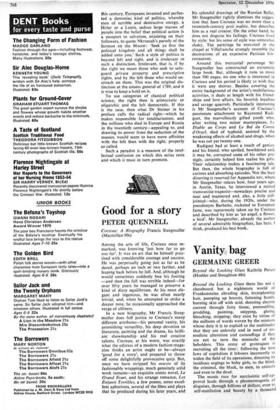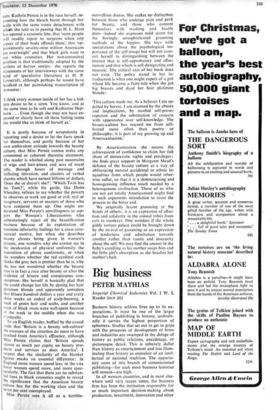Vanity bag
GERMAINE GREER
Beyond the Looking Glass Kathrin Perutz (Hodder and Stoughton 48s) Beyond the Looking Glass there lies not a chessboard but a nightmare world of Frankensteins abrading skin, transplanting hair, pumping up breasts, fattening hands, burning skin off with acid, shooting electric current through fatty tissue, pummelling. prodding, painting, snipping, gluing, bleaching, stripping; they exist by virtue of the millions of words woven by the minions whose duty it is to explaiA to the multitudes that they are unlovely and in need of im- mediate alteration and camouflage if they are not to turn the stomachs of the beholders. This army of grotesques is recruiting all the time: following the iron laws of capitalism it labours incessantly to widen the field of its operations, directing its insidious urgings to baby girls, to the blind, the criminal, the black, to men, to animals and even to the dead.
The manic race for narcissistic self-ap- proval leads through a phantasmagoria of disguises, through billions of dollars, even to self-mutilation and beauty by a thousand cuts. Kathrin Perutz is in the race herself, re- counting how the bleach burnt through her scalp with the same ironic detachment with whish she told us in passing that H. L. Hunt has opened a cosmetic line, that 'soon people will readily repair to surgeons when any aspect of their body offends them', that 'ap- proximately seventy-nine million Americans are overweight' and that black girls want to use white cosmetics. Her non-committal position is that traditionally adopted by the writers of horror stories: she reports the statements of her interviewees with the same kind of speculative literalness as H. P. Lovecraft, although perhaps he would have baulked at her painstaking transcription of nonsense: 'I think every woman inside of her has a hid- - den desire to be a siren. You know, and at the same time to be soft and Katharine Hep- burn . . . Even though she may not have ex- plored or clearly have all these feeling tones she would like to think of herself as.'
It is partly because of scrupulosity in reporting and a desire to let the facts speak for themselves, and partly because of her own ambivalent attitude towards the beauty culture, that Miss Perutz cannot make any committed or coherent theoretic statement. The reader is whirled along past mountains of wigs and hair-pieces and seas of royal jelly, through hours of massage and titillating titivation, and clusters of verbal charms which have earned billions of dollars, 'Does she or doesn't she?', 'Which Twin has the Toni?', while his guide, like Denis Wheatley, refuses to say whether the powers he observes at work are good or evil, real or imaginary, servants or masters of those who have conjured them up. One might un- derstand Miss Perutz's unwillingness to sup- port the Women's Liberationists who unhesitatingly reject all the beautification business because of its exploitation of feminine inferiority feelings for a crass com- mercial motive, but when she describes beauty classes being given in women's prisons, one wonders why she cannot see in the inculcation of physical uniformity the imposition of phony conformity, or when she wonders whether the red cardinal cock thinks the grey hen is prettier than he is, why she has not wondered whether the beauty race is in fact a race after beauty or after the evidence of leisure and conspicuous con- sumption. She herself is basically glad that she could change her life by dyeing her hair platinum blonde and apparently considers that fifteen hundred dollars a year and every three weeks an ordeal of scalp-burning, a week of green hair and scabs, and another Week of black roots were well-spent because of the week in the middle when she was Cinderella.
To an English reader, baffled by the casual aside that 'Britain is a beauty sub-culture' the excesses of the situation do seem to have resulted from America's affluence, although Miss Perutz claims that 'Britain spends almost as much per capita on beauty pro- ducts and services as does America'. I suspect that the similarity of the blanket figures masks an essential difference: in England more women spend less; in the use fewer women spend more, and more spec- tacularly. The fact that there are no substan- tial lines in black cosmetics ought to reveal the significance that the American beauty culture has for the working class and the seven per cent unemployed. Miss Perutz sees it all as a terrible- marvellous dream. She makes no distinction between those who undergo pain and peril for beauty, and those who content themselves with washing and health diets—indeed she expresses mild scorn for the boringly unsophisticated grooming methods of the hippies. She toys with speculations about the psychological im- portance of the self-image but will not com- mit herself to distinguishing between the interest that is self-approbatory and affec- tionate and that which is self-denigrating and neurotic. The critical axis of her book does not exist. The policy stated in her in- troduction is what one might expect of a girl whose life became a fairy-tale when she got big breasts and dyed her hair platinum blonde: 'This culture made me. As a believer I am ap- palled by heresy. I am alarmed by the abuses and implications, by morbid self-preoc- cupation and the substitution of concern with appearance over self-knowledge. The beauty-culture has rescued me from self- hatred more often than poetry or philosothy; it is part of my growing up and Americanisation.'
By Americanisation she means the achievement of confidence to claim her full share of democratic rights and privileges : she finds great support in Margaret Mead's defence of the beauty culture as a way of obliterating natural accidental or ethnic in- equalities from which people would other- wise suffer, so that it is a democratising and ' homogenising influence much needed by a heterogenous civilisation. Those of us who are not yet totally Americanised might find in such arguments stimulation to resist the process to the bitter end.
We originally learnt grooming at the hands of others : it is an expression of affec- tion and solidarity in the animal tribes from cats to monkeys. One wonders if the whole giddy torture palace could be brought down by the revival of grooming as an expression of tenderness and admiration towards another rather than vanity and insecurity about the self. We may find the answer in the baby's carolling as his mother soaps him and the little girl's absorption as she brushes her mother's hair.











































 Previous page
Previous page